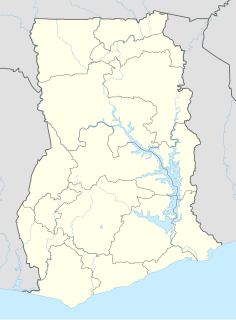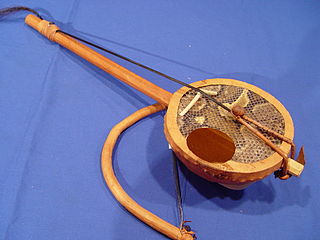
The music of Togo has produced a number of internationally known popular entertainers including Bella Bellow, Akofah Akussah, Afia Mala, Itadi Bonney, Wellborn, King Mensah and Jimi Hope.

Ghana is a country of 28.21 million people and many native groups, such as:
The Dagombas are a Gur ethnic group of northern Ghana, numbering about 931,000 (2012). They inhabit the Northern Region of Ghana in the sparse savanna region below the sahelian belt, known as the Sudan. They speak the Dagbani language which belongs to the More-Dagbani sub-group of the Gur languages. There are around 1 million speakers of Dagbani. The Dagomba are historically related to the Mossi people. The More/Mossi now have their homeland in central present-day Burkina Faso. The homeland of the Dagomba is called Dagbon and covers about 20,000 km2 in area.
Dagbani, also known as Dagbanli and Dagbanle, is a Gur language spoken in Ghana. Its native speakers are estimated around 1,160,000 (2013). It is a compulsory subject in primary and junior high school in the Dagbon Kingdom, which covers the eastern part of the region. Dagbani is the most widely spoken language in northern Ghana, especially among acephalous tribes overseen by the King of Dagbon, the Ya-Na.

The Northern Region is one of the sixteen regions of Ghana. It is located in the north of the country and was the largest of the sixteen regions, covering an area of 70,384 square kilometres or 31 percent of Ghana's area until December 2018 when the Savannah Region and North East Regions were created from it. The Northern Region is divided into 14 districts. The region's capital is Tamale.

Bawku is a town and is the capital of the Bawku Municipal District, district in the Upper East region of north Ghana, adjacent to the border with Burkina Faso. Bawku has a 2012 settlement population of 69,527 people.
The Gonja language is a North Guang language spoken by an estimated 230,000 people, almost all of whom are of the Gonja ethnic group of northern Ghana. Related to Guang languages in the south of Ghana, it is spoken by about a third of the population in the northern region. The Brong-Ahafo and Volta regions lie to the south of the Gonja-speaking area, while Dagombas, Mamprussis and Walas are to the north. Its dialects are Gonja and Choruba.

Salaga is a town and is the capital of East Gonja district, a district in the Savannah Region of north Ghana. Salaga has a 2012 settlement population of 25,472 people.

The goje is one of the many names for a variety of one or two-stringed fiddles from West Africa, almost exclusively played by ethnic groups inhabiting the Sahel and Sudan sparsely vegetated grassland belts leading to the Sahara. Snakeskin or lizard skin covers a gourd bowl, and a horsehair string is suspended on bridge. The goje is played with a bowstring.

Ghana is a multilingual country in which about eighty languages are spoken. Of these, English, which was inherited from the colonial era, is the official language and lingua franca. Of the languages indigenous to Ghana, Akan is the most widely spoken.
Articles related to Ghana include:
Ghanaian names consist of several given names and surnames based on the language of ethnic groups in Ghana: including Akan, Mole-Dagombas, Ga, Ewe and Nzema. Frequently, children are given a "day name" which corresponds to the day in the week when they were born. These day names have further meanings concerning the soul and character of the person. Middle names have considerably more variety and can refer to their birth order, twin status, or an ancestor's middle name. These names are also used among Ghanaians living abroad and among Africans living in the diaspora who wish to identify with their ancestral homeland. During the 18th and 19th centuries, the enslaved people from modern day Ghana in the Caribbean were referred to as Coromantees. Most day names among the Mole-Dagombas are usually given to the females, and few are given to both sexes.

The Bugum Chugu is the first Dagomba festival in the year. It is celebrated in the first month of the Dagomba lunar year, the Bugum Goli, and is celebrated on the ninth day of the month. The festival is celebrated to remember the "lost of a chief son".

Savelugu is a town and the capital of Savelugu Municipal, a municipality in the Northern Region of north Ghana. Savelugu has a 2012 settlement population of 38,074 people.
Dagbani music and dance is a core tradition of the Dagbamba or Dagomba people. The Dagbamba speak the Dagbani language. They are the dominant ethnic group in the chiefdom of Dagbon found in the Northern Region of Ghana. Music and dance plays a central role in Dagbon. It is through these arts that the Dagbamba have preserved their history over the centuries. The Dagbamba regard dancing as a form of emotional expression, social interaction, a spiritual performance or even physical exercise that aids them articulate or illustrate ideas or tell a story. In most cases, music in Dagbon is accompanied by dancing in order to form a complete story.

The Kingdom of Dagbon is one of the oldest and most organised traditional kingdoms in northern Ghana founded by the Dagomba people (Dagbamba) in the 11th century. During its rise, it comprised, at various points, the Northern, Upper West and Upper East regions of present-day Ghana. Since Ghana's independence in 1957, the Kingdom just like all of Ghana's kingdoms and tribal states has assumed a traditional, customary role.
The Nanumba people are an ethnic group whose traditional homeland is in the southeast of the Northern Region of Ghana. They speak Nanun, a Gur language.
Sherif Abdul Majeed, known by his stage name Maccasio, is a Ghanaian Hip hop, Hiplife, and Afropop recording Artist and Entrepreneur. He is from the Kingdom of Dagbon, in the Northern Region of Ghana. Maccasio raps and sings in his native language Dagbani with the ability to mix it with terms in English and Twi. In other occasions in Tamale, he shared stages with artists Davido, Shatta Wale, Samini, Stonebwoy, and VVIP.







